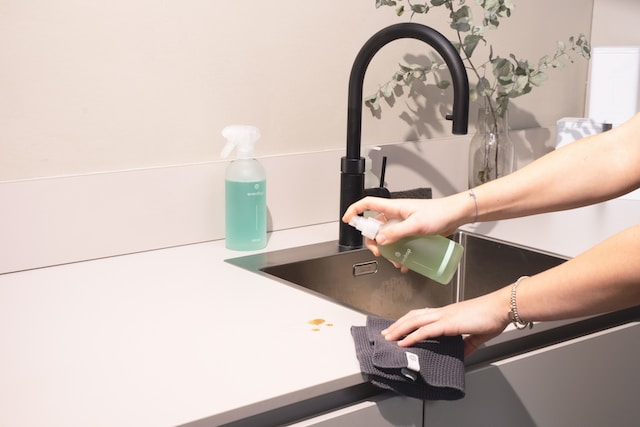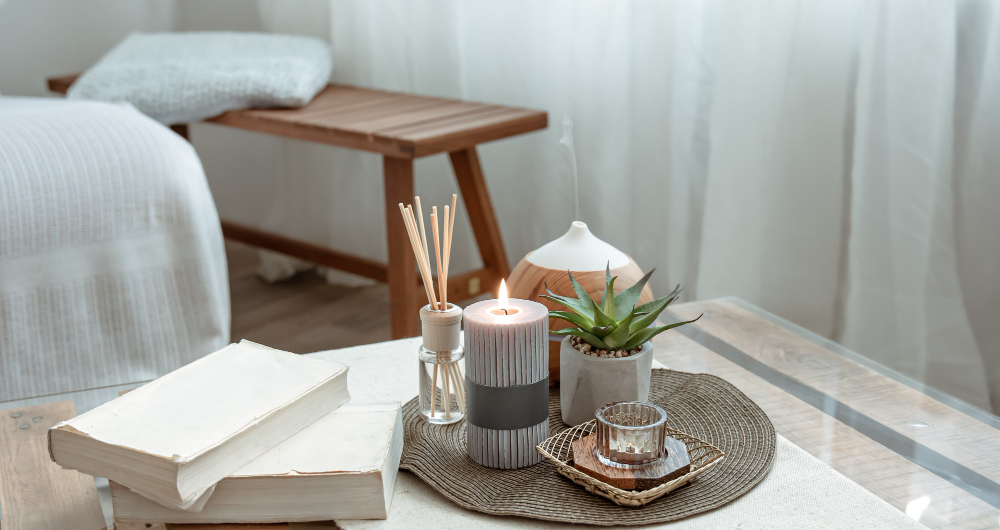Admit it: nobody likes a strong odor. Whether they come from cooking, chemicals, garbage, or any of a number of other sources, odors can impact our health and how we go about life. Read on to learn about the effects of different odors and how you can neutralize them for a fresher, cleaner home.
Why odors matter
Odors can affect not only your physical health but also how you perceive the space with the odor. For example, if you’re looking to buy a new home and you step into a house that stinks of garbage or old cat litter, your impression of the place will likely be that it’s unclean or unhealthy. Aside from being unpleasant to experience, certain kinds of odors – like mold or pet urine – can impact your health. Taking care of unpleasant odors often requires more than spraying air freshener, which only masks an odor.
Migraines
Some odors can trigger migraines in certain people. The more obvious culprits are bleach, solvents, detergents, pesticides, gasoline, car exhaust, and other chemicals with heavy fumes. Other, less obvious culprits can also cause migraines. These odors include:
- Artificial scents
- Nail polish
- Cigarette smoke
- Cooking smoke
Lung irritation
Chemicals with strong smells, such as bleach or ammonia, can cause irritation to the lungs when they’re inhaled. Similarly, smoke, heavy perfumes, and solvents can also cause lung irritation and even provoke an asthma attack. Minimize exposure to indoor and outdoor pollutants to ensure better lung health as you age.
Throat irritation
Naturally, a smoky room can cause your throat to become irritated, but did you know that the lingering odor of smoke can do the same? The same kinds of odors that trigger lung irritation also irritate the throat and other mucous membranes.
Allergies
Temporary smells, such as strong perfumes, can trigger an allergic response in people who are sensitive to fragrance. The fortunate thing, in this case, is that the trigger eventually goes away. The biggest source of odor-based allergic reactions comes from odors that don’t go away, like pet urine and mold.
Why your home insurance company cares
Odors might be one of the last things you’d expect a home insurance company to care about, but the fact is odors can be a cause for concern. Odors may be either an indicator or result of a problem they provide coverage for.
Here are a few possible scenarios:
- You have a mold odor leftover from a previous covered emergency, such as a water heater explosion
- You have a smoky odor leftover from a previous fire
- You have the odor of sewage leftover from a sewage backup
Identifying and eliminating common household odors

The home can be the site and source of many different types of odors stemming from various sources. Some of the more common odors include:
- Musty or moldy odors
- Pet odors
- Cooking odors
- Smoke odors
- Chemical odors
- Trash and garbage odors
- Sewer odors
Musty or moldy odors
One of the biggest areas of concern when it comes to new or lingering odors is mold. Mildew is a faint musty odor, while mold often has a stronger, earthier smell that many people can’t tolerate. More often than not, this odor is the first indication that you might have a mold problem. While a musty smell may not necessarily mean that your home has mold or is in the process of developing mold, one is often connected to the other.
In terms of how the presence of mold affects your health, the problem is not actually the odor itself. Mold produces irritants that can trigger an allergic reaction in some people, including sneezing, red eyes, rashes, and a stuffy or runny nose. Mold can also cause asthma attacks or more severe allergic reactions.
Tips to help you banish unwanted mold smells:
Mold can grow in damp areas, such as bathrooms or areas with poor ventilation. In this case, you’ll need to address the cause of the odor and take steps to prevent further growth. After remediation, clean any affected areas with white vinegar to get rid of any remaining odor. A dehumidifier with a HEPA filter will go a long way toward preventing regrowth.
Pet odors
We all love our pets, but let’s face it: they can be stinky. From pet dander, dirty litter boxes, carpet accidents, and smelly chew toys, there are a host of odors that can come from your little buddy. The first line of defense is to keep the litter box clean, vacuum or sweep regularly, pick up accidental feces, and brush your pet often to get rid of loose fur. Pet urine spots in the home or outside the litter box can be a little more difficult, especially if they happen to be on an absorbent surface like a carpet or sofa.
Tips to help remove unwanted urine smells
If the spot is fresh, try cleaning it up with a pet-specific odor-eliminating solution or even with a mixture of white vinegar and water. For urine spots that have set in, consider shampooing the area or having it professionally cleaned. The scent of a pet’s urine can keep them returning to use that area as a bathroom. A good cleaning, followed by the use of an air purifier with a carbon filter, can help with any lingering odor.
Cooking odors
Every type of food you can cook will naturally produce a smell, but some tend to have stronger, more pervasive odors. Likewise, strong cooking-related odors can also come from how you cook the food, such as in the microwave or by frying it. Here are some of the most common food-related odors:
- Burned food
- Fish
- Chopped onions
- Cruciferous vegetables (broccoli, brussels sprouts, cabbage, etc.)
- Stale popcorn
- Dirty cooktops and microwaves
- Chopped garlic
- Spicy foods, such as curry
Ways to keep your home kitchen clean and fresh:
The first part of eliminating cooking odors is to make sure your kitchen is properly ventilated. If you don’t have an exhaust fan, consider opening a window or even a door to ensure proper airflow.
Neutralizers that help with bad odors:
- Simmer citrus peels or sweet spices in a pot of water on the stove
- Use an air purifier with a HEPA filter
- Leave a small bowl of baking soda or white vinegar on the counter overnight
- Microwave a lemon slice in a mug of water, on high, for five minutes. Allow it to cool down completely before wiping the inside of the microwave
- Clean your kitchen surfaces regularly

Smoke odors
Smoke can leave a strong residual odor in the home, no matter its source. There are obvious sources, like cigarettes, burning food, or even a previous house fire, but you can also get the odor of smoke from a fireplace or dirty elements on your stove. The smell of smoke is particularly stubborn since it has a way of seeping into fabric and carpeting.
Tricks to eliminate unpleasant smoke odors:
Assuming the smell isn’t from a previous fire, the first step is to eliminate the smoke, whether it’s from a cigarette, stove, or fireplace. Open your windows, get a fan or two going, and help the smoke find its way out. Fresh air can do wonders to get rid of the smell of smoke in the air. Once the air is cleared, you can help get rid of the lingering smell on your hard surfaces by wiping them down with white vinegar. A good washing may be needed for carpets, upholstery, and clothing. Consider sprinkling baking soda on your carpets and allowing them to sit for a few minutes before vacuuming.
In instances where the smoke odor stems from a previous fire, you should be able to get your home insurance provider to cover the cost of neutralizing the odor since they offer coverage for smoke damage.
Chemical odors
Heavy-duty cleaning products, pesticides, and other harsh chemicals can leave a nasty odor if the home is not properly ventilated. Chemical odors can be a substantial trigger for asthma attacks and allergic reactions, so it may be best to use mild or natural substitutions to avoid the resulting odor.
Eliminate Unpleasant Chemical smells:
If you can’t use other alternatives, make sure to get fresh air circulating through your home by opening windows and using a fan or two. An air purifier is also useful in getting rid of chemical odors.
If the odor seems to be stronger than your purifier and some fresh air can manage, try leaving small bowls of activated charcoal around your home until the odor is gone. Charcoal is often used in filters, as it’s great for absorbing impurities from the air. If you don’t have access to charcoal, baking soda is a good substitution. Coffee drinkers can also put their used (dry) grounds into bowls to help absorb foul odors.
Trash and garbage odors
The garbage bin is probably one of the most obvious sources of foul odors in the home. After all, we throw our dirty containers, fruit and vegetable peelings, spoiled food, packaging, dirty tissues, and much more into those bins. It’s only natural that they would start to smell after a while. You can help keep the smell down by making sure you use good-quality garbage bags that fit your bin properly. A bag that collapses into the bin, or rips easily, defeats the purpose of containing the garbage.
Trash and garbage odors solutions:
The trash bins you keep in other areas of the home can also get stinky, especially if they’re in the bathroom. Like kitchen garbage, the best place to start is to make sure you use good quality bags.
Help keep the bin odor down by washing them out regularly with hot water and anti-bacterial detergent or soap. Wiping the clean surfaces with white vinegar gives the detergent an extra odor-eliminating boost. Once the bin is dry, try sprinkling some baking soda on the bottom before you put it in a new bag. This helps absorb odors as they occur.
Sewer odors
A lingering sewage odor in your home can be particularly nasty, especially since the odor may have resulted from a clogged sewer line, a leaking pipe, or a dry plumbing trap. The first step in eliminating the sewage smell is to figure out where it’s coming from and take measures to fix the problem.
Banish sewer odors with these tips:
In the case of a dry plumbing trap, simply flushing your toilet or turning on the faucet will go a long way to addressing the problem. If the issue is caused by something you can’t fix yourself, then a call to the plumber may be in order.
After the problem is fixed, make sure there’s good airflow going through the home. Deodorize a sink drain by sprinkling half a cup of baking soda down the drain, followed by one cup of plain white vinegar. After allowing the mixture to bubble for a few minutes, run the hot water. You can also soak a few cotton balls in vanilla baking essence and place them in bowls around your home to add a nice smell. Likewise, placing bowls of activated charcoal around the home can help immensely.
Think “neutralize,” not “mask”
Deodorizers and other solutions designed to make a room smell like a summer breeze only mask the odor temporarily instead of neutralizing it. Once the deodorizer wears off, the odor will still be there. Using neutralizers means getting rid of the odor, which is especially important in real estate and ensuring good health.
General neutralizers for a cleaner house

Solutions that neutralize odors, whether they are natural or store-bought, are far more effective than spray deodorizers or other supposed remedies that only mask the smell. In this section, you’ll learn how to neutralize odors the natural way.
Activated charcoal
Activated charcoal is used in all kinds of ways, from the medical field to air and water purification. If you have an air purifier or an HVAC system, activated charcoal is often present in the filter. Charcoal is a particularly effective odor eliminator due to its ability to trap and absorb foul smells. If you don’t have a package of activated charcoal, you can use charcoal BBQ briquettes. Simply place some in small bowls around the home or wherever the odor is present.
Baking soda
Most people have baking soda already in their kitchen cupboards because it’s frequently used in baking. These days, you can get baking soda odor eliminators specifically designed to go into your refrigerator or garbage bin, but you don’t need to get fancy – regular baking soda placed in a small bowl or sprinkled around works fine.
A great way to freshen your carpets and rugs is to sprinkle some baking soda over them, let it sit for a few hours, and then vacuum it up. Baking soda is also useful for absorbing moisture from the air in places that are prone to dampness.
Hydrogen peroxide
Hydrogen peroxide is a hospital-grade disinfectant, but it can also eliminate odors. Peroxide takes care of odors by oxidizing the bacteria causing the odor and breaking down the volatilized compounds associated with the smell. Mixing equal parts water and peroxide together in a spray bottle gives you an effective odor eliminator for pet urine, mold, and mildew. Simply spray it onto the affected area, let it sit for several minutes, and then wipe it up.
White vinegar
White vinegar is the go-to natural solution for all kinds of housekeeping problems, including odor elimination. As a mild acid, white vinegar works by breaking down the compounds that cause the odor and cleaning up any visible residue. You can use white vinegar as it is, but most people prefer to mix it equally with water before applying it to the affected area. Once you spray the vinegar, wait a few minutes before wiping it up.
Candles
Candles can be a great option for neutralizing house odors and creating a fresh, inviting living space. Many candles are infused with essential oils or other fragrances that can help mask unpleasant smells from cooking, pets, or other sources. Additionally, candles can help create a cozy, relaxing atmosphere in your home. Be sure to choose high-quality candles made from natural ingredients to avoid introducing harmful chemicals into your living space. And, as with any open flame, it’s important to practice proper safety precautions and never leave a burning candle unattended. With the right candle and a few simple safety measures, you can enjoy a fresh, pleasant-smelling home.
Essential oils
Essential oils can be natural or synthetic plant oils. Some essential oils, like tea tree and eucalyptus, have strong antibacterial and antifungal properties, making them extremely useful in odor control and housekeeping in general. Essential oils can be used in cleaning solutions, diffusers, or air purifiers, but it is very important to know that before using essential oils, it’s important to be properly informed about them and how to handle them. Some of the more popular oils for odor elimination include:
- Tea tree
- Eucalyptus
- Lavender
- Lemon
Sprays
Sprays infused with plant-based ingredients offer an effective solution to neutralize odors in a natural and sustainable manner. These botanical sprays have gained popularity due to several compelling reasons. First, they harness the power of essential oils derived from plants, which possess inherent properties to counteract unpleasant smells. Second, plant-based sprays are free from harmful chemicals commonly found in synthetic air fresheners, making them a healthier choice for both humans and the environment. Furthermore, sprays are versatile in their application and can be used in various areas of the house, including bathrooms, kitchens, living rooms, and bedrooms. They offer a wide range of scents to suit individual preferences, allowing homeowners to personalize their living spaces with pleasant fragrances.

Eliminating odors through deep cleaning is crucial to address various issues, such as hindering the sale of a house or exacerbating asthma symptoms. While persistent odors may stem from more complex issues, most household odors can be effectively eliminated. This article provides practical guidance on deep cleaning techniques to tackle unpleasant odors in your home, ensuring a consistently fresh and inviting atmosphere.




